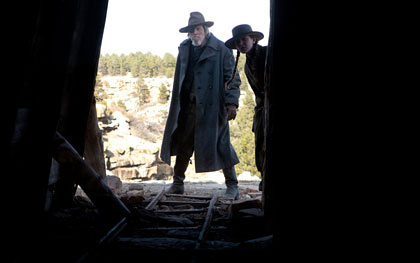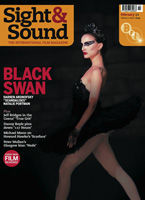Film review: True Grit

The Coen brothers’ True Grit might be less faithful to Charles Porits’s original novel than Henry Hathaway’s 1969 adaptation, but, finds Ben Walters, the brothers retain the book’s grotesque touches and add a few more themselves
For the epigraph to their new adaptation of Charles Portis’s 1968 novel True Grit, Joel and Ethan Coen adopt one of its narrator’s chosen sayings: “The wicked flee where none pursueth.” It’s from the Book of Proverbs and continues, “but the righteous are bold as a lion.” Mattie Ross (Hailee Steinfeld) is bold, all right. The 14-year-old daughter of a murdered man, she’s out for justice or, failing that, vengeance, and displays disarmingly precocious efficacy: she’s a formidable horse-trader both literal and metaphorical, securing cash for her father’s livestock and using it to obtain the services of agreeably pitiless marshal ‘Rooster’ Cogburn (Jeff Bridges), whom she accompanies – along with self-regarding Texan ranger LaBoeuf (Matt Damon) – as they track Tom Chaney (Josh Brolin) through the Chocktaw Nation. The Coens’ pictures are studded with such capable, no-nonsense women. Yet there’s also something of the avenging fury about Mattie: the Coens’ Cogburn calls her a “harpie” and Portis has her ejaculate, “I would not rest easy until that… cur was roasting and screaming in hell!” Is she, then, kin to Fargo’s Marge Gunderson or No Country for Old Men’s Anton Chigurh? And would being heir to either lineage count for more than her being a child?
Portis’s novel is terse, witty, unsentimental and compulsive, its style not too many days’ ride from Cormac McCarthy, its action peppered with God, gore and law-talk. Henry Hathaway’s 1969 adaptation was highly faithful, though the Technicolor palette, sprinkling of Wayne-isms and ameliorated ending – not to mention the cheesy theme song – softened things. The film won John Wayne his Oscar and delivered a character, ornery but good, who was thought to warrant further prospecting. But 1975’s Rooster Cogburn, a collision of True Grit and The African Queen with Wayne and Katharine Hepburn, and a 1978 TV pilot with Warren Oates, failed to take. Now the story lets the Coens fully engage the western, a genre whose motifs have long laced their work, and reteam with Bridges, their Big Lebowski. His Cogburn is meaner than Wayne’s but no less heroic. And the Coens’ movie is less faithful than Hathaway’s but stronger – the production, by their regular team, is formally superb – and weirder.
Bridges’s Cogburn is first heard in the outhouse and seen in court, a bear with a sore head and neatly parted hair. The Coens play up his dry realism (his understated “Well, that didn’t pan out” recalls No Country’s “It’ll do till the mess gets here”) and add notes of cruelty to an already hardened character: he kicks a child for the hell of it and makes agonising sport of a comrade’s fresh wounds. This ambivalence sharpens the crucial moment when Cogburn seems to desert Mattie, and is underscored by Carter Burwell’s music, which is derived from ‘Leaning on the Everlasting Arms’, the hymn made strange by The Night of the Hunter (1955). True Grit is less unsettling than that story – the male authority figure is, in the end, a good and reliable man – but the Coens inject something of its macabre fairytale timbre, retaining the book’s grotesque touches and adding more. They make Mattie sleep in a funeral parlour and add a forest sequence with a hanged, bird-pecked man, a mysterious Native American and a big bearded dentist who looks like a bear on horseback; they send the grandiloquent LaBoeuf away twice and mangle his tongue; and the story’s final, desperate ride becomes a swooning fantasia through which sweep stars and knives and bodies in the dirt. The tone is apt: for all her sharpness, this Mattie more than any other is plainly childlike, with her puppy fat, pigtails and too-big clothes, her moments of joy and terror. “I don’t believe in fairytales or sermons or stories about money, baby sister,” Cogburn tells her. Yet he proves himself to be the good hunter after all.
See also
Cash and carrionBen Walters and J.M. Tyree on No Country for Old Men (February 2008)
Unchained MelodiesKevin Jackson reviews Oh Brother, Where Art Thou? (December 2000)


